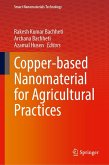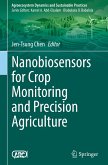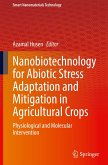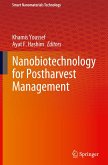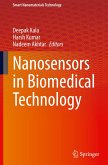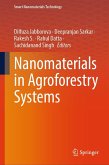Emerging Nanotechnologies in Agroecosystem Management
Herausgegeben:Fraceto, Leonardo Fernandes; Sarkar, Deepranjan; Rakesh, S.; Datta, Rahul; Singh, Sachidanand
Versandkostenfrei innerhalb Deutschlands
129,99 €
inkl. MwSt.
Versandkostenfrei*
Erscheint vorauss. 24. Januar 2026
Melden Sie sich
hier
hier
für den Produktalarm an, um über die Verfügbarkeit des Produkts informiert zu werden.

65 °P sammeln
Emerging Nanotechnologies in Agroecosystem Management
Herausgegeben:Fraceto, Leonardo Fernandes; Sarkar, Deepranjan; Rakesh, S.; Datta, Rahul; Singh, Sachidanand
- Gebundenes Buch
This book covers the challenges and applications of nanotechnology for managing agroecosystems from maintaining seed quality and ends with food packaging and processing. It covers the use of nanocomposites to manage seed germination, nutrition, biotic and abiotic stresses, and the productivity of crops and the use of nanosensors in detecting pests, pathogens, and pollutants and forecasting soil and crop health. In addition, it also focuses on the risk assessment and regulatory policies of nanoparticles to explore the potential of smart delivery systems in agroecosystems. The book is helpful…mehr
Andere Kunden interessierten sich auch für
![Copper-Based Nanomaterial for Agricultural Practices Copper-Based Nanomaterial for Agricultural Practices]() Copper-Based Nanomaterial for Agricultural Practices186,99 €
Copper-Based Nanomaterial for Agricultural Practices186,99 €![Nanobiosensors for Crop Monitoring and Precision Agriculture Nanobiosensors for Crop Monitoring and Precision Agriculture]() Nanobiosensors for Crop Monitoring and Precision Agriculture136,99 €
Nanobiosensors for Crop Monitoring and Precision Agriculture136,99 €![Nanobiotechnology for Abiotic Stress Adaptation and Mitigation in Agricultural Crops Nanobiotechnology for Abiotic Stress Adaptation and Mitigation in Agricultural Crops]() Nanobiotechnology for Abiotic Stress Adaptation and Mitigation in Agricultural Crops134,99 €
Nanobiotechnology for Abiotic Stress Adaptation and Mitigation in Agricultural Crops134,99 €![Nanobiotechnology for Postharvest Management Nanobiotechnology for Postharvest Management]() Nanobiotechnology for Postharvest Management134,99 €
Nanobiotechnology for Postharvest Management134,99 €![Nanosensors in Biomedical Technology Nanosensors in Biomedical Technology]() Nanosensors in Biomedical Technology164,99 €
Nanosensors in Biomedical Technology164,99 €![Biological Applications of Nanoparticles Biological Applications of Nanoparticles]() Biological Applications of Nanoparticles65,99 €
Biological Applications of Nanoparticles65,99 €![Nanomaterials in Agroforestry Systems Nanomaterials in Agroforestry Systems]() Nanomaterials in Agroforestry Systems136,99 €
Nanomaterials in Agroforestry Systems136,99 €-
-
-
This book covers the challenges and applications of nanotechnology for managing agroecosystems from maintaining seed quality and ends with food packaging and processing. It covers the use of nanocomposites to manage seed germination, nutrition, biotic and abiotic stresses, and the productivity of crops and the use of nanosensors in detecting pests, pathogens, and pollutants and forecasting soil and crop health. In addition, it also focuses on the risk assessment and regulatory policies of nanoparticles to explore the potential of smart delivery systems in agroecosystems. The book is helpful for students, researchers, growers, policymakers, in the field of nanotechnology in agriculture, sustainable agriculture, soil science, and environmental science.
Produktdetails
- Produktdetails
- Smart Nanomaterials Technology
- Verlag: Springer / Springer Nature Singapore / Springer, Berlin
- Artikelnr. des Verlages: 978-981-95-0186-1
- Seitenzahl: 517
- Erscheinungstermin: 24. Januar 2026
- Englisch
- Abmessung: 235mm x 155mm
- ISBN-13: 9789819501861
- ISBN-10: 9819501865
- Artikelnr.: 74764762
- Herstellerkennzeichnung
- Libri GmbH
- Europaallee 1
- 36244 Bad Hersfeld
- gpsr@libri.de
- Smart Nanomaterials Technology
- Verlag: Springer / Springer Nature Singapore / Springer, Berlin
- Artikelnr. des Verlages: 978-981-95-0186-1
- Seitenzahl: 517
- Erscheinungstermin: 24. Januar 2026
- Englisch
- Abmessung: 235mm x 155mm
- ISBN-13: 9789819501861
- ISBN-10: 9819501865
- Artikelnr.: 74764762
- Herstellerkennzeichnung
- Libri GmbH
- Europaallee 1
- 36244 Bad Hersfeld
- gpsr@libri.de
Leonardo Fernandes Fraceto has a bachelor's degree in chemistry from the State University of Campinas (1997), a master's in functional and molecular biology from the State University of Campinas (2000), and a Ph.D. in functional and molecular biology from the State University of Campinas (2003). He is currently Associate Professor at the Institute of Science and Technology of São Paulo State University (UNESP), Campus Sorocaba at the Environmental Engineering undergraduate course and at the postgraduate in Environmental Sciences. He coordinated the Postgraduate Program in Environmental Sciences of Unesp/Sorocaba (from 2012 to 2016). He has experience in chemistry and biochemistry, with an emphasis on environmental nanotechnology and applications of nanotechnology in agriculture. Dr. Fraceto has developed carrier systems for herbicides and other compounds of interest for pest control in agriculture, resulting in research articles and patents. Dr. Deepranjan Sarkar is working as Assistant Professor (Soil Science) at the Agriculture Department of Integral University, Lucknow, India. His research interests include soil fertility, plant nutrition, plant-microbe interactions, carbon sequestration, and UNSDGs. Dr. Sarkar is involved in teaching soil science subjects at UG and PG levels. He has won some prestigious awards from esteemed organizations like BHU, IIT-KGP, TWAS, etc. He is Member/Life Member of several professional societies like AMI, ISC, IUCN, etc. Dr. S. Rakesh is working as Research Associate at ICAR-National Academy of Agricultural Research Management (NAARM), Hyderabad, Telangana-500030, India. His research interests include conservation agriculture, carbon sequestration, integrated nutrient management, land restoration, and climate change adaptation. During his Ph.D. program, he worked on carbon pools and cleaner production practices and published his work in reputed journals. He has also worked as Senior Research Fellow in the Australian (ACIAR) funding Project “Sustainable & Resilient Farming System Intensification- SRFSI” from 2015 to 2019. He has received best thesis award (2019) and young scientist award (2021). Dr. Rakesh is Member of several professional societies and organizations like ISCA-Kolkata, COBACAS, IUCN, etc. He is actively involved in delivering invited lectures at conferences and universities and participating in extension works with numerous Farmer’s Clubs. Dr. Rahul Datta is Asst. Professor in the field of soil science and currently is working at Mendel University in Brno, Czech Republic. His research has focused largely on increasing crop productivity using “green” and sustainable methods. Some of the most notable problems he has addressed through his research are drought stress, heavy metal toxicity in soil, and climate change greenhouse gas. His research has helped in increasing the quality and productivity of staple crops like wheat maize, barley, rice, and other crops like mangoes, spinach, and cotton. His work has been cited in excess of 2200 times by researchers from all over the world, including research groups at major national institutions in the United States, such as the USDA. Dr. Sachidanand Singh obtained B.Tech. in biotechnology, M.Tech. in bioinformatics, and Ph.D. in bioinformatics. He has a postdoctoral research experience from the College of Pharmacy, Ohio State University, USA. His specialization area includes plant biotechnology, systems biology, and drug design. He has more than 12 years of research and academic experience. He has served for a decade in the School of Biotechnology and Health Sciences, Karunya University, Coimbatore, Tamil Nadu, India. He also worked as Consultant for the College of Pharmacy, Ohio State University, as Statistical Genetics during the year 2018.
Introduction to Nanoengineering in Agroecosystem Management.- Plant-Based Synthesis of Metal Nanoparticles for agroecosystem.- Bionanomaterial Synthesis from Agricultural Waste.- Nano sensors for Agroecosystem Monitoring.- Interactions, toxicity, and the fate of nanoparticles in agroecosystems.- Nano-seed science for revolutionizing the seed industry.- Nano-fertilizers for plant nutrition.- Nano-biofertilizers for sustainable soil management.- Nanobiosensors for detection of soil health.- Efficacy of nano-herbicides in weed management of cereals.- Nano-pesticides for controlling polyphagous pests.- Nanosensors for detection of plant pathogens.- Alleviation of salt, drought, nutrient, and other plant-affecting stresses through nanoparticles.- Removal of environmental pollutants through smart nanohybrids.- A carbon-based nanocomposite for environmental cleaning.- Nanosensors for detection of heavy metals/pollutants in plants and soil.- Risk assessment, and regulatory policies for nanoparticles in relation to agricultural practices.- Nanoparticles in Plant Growth and Health.
Introduction to Nanoengineering in Agroecosystem Management.- Plant-Based Synthesis of Metal Nanoparticles for agroecosystem.- Bionanomaterial Synthesis from Agricultural Waste.- Nano sensors for Agroecosystem Monitoring.- Interactions, toxicity, and the fate of nanoparticles in agroecosystems.- Nano-seed science for revolutionizing the seed industry.- Nano-fertilizers for plant nutrition.- Nano-biofertilizers for sustainable soil management.- Nanobiosensors for detection of soil health.- Efficacy of nano-herbicides in weed management of cereals.- Nano-pesticides for controlling polyphagous pests.- Nanosensors for detection of plant pathogens.- Alleviation of salt, drought, nutrient, and other plant-affecting stresses through nanoparticles.- Removal of environmental pollutants through smart nanohybrids.- A carbon-based nanocomposite for environmental cleaning.- Nanosensors for detection of heavy metals/pollutants in plants and soil.- Risk assessment, and regulatory policies for nanoparticles in relation to agricultural practices.- Nanoparticles in Plant Growth and Health.

